European Permaculture Convergence 2018 - The Harvest
New Partnerships in PermacultureIt consists of the following parts according to the EuPC18 programme:
European Permaculture Network EuPN
EuPC Methods & Tools
EuPC Contributors & Workshop List
Reaching beyond our Edges: guestpanel
Expanding our Edge: collective session
The European Permaculture Network
The European Permaculture Network (EuPN) is a network of national and regional organisations and networks of practitioners in Permaculture. EuPN is a platform for common interests and action throughout Europe.
www.permaculture-network.eu
We envision a divers and vibrant Europe, grounded in the ethics of Permaculture.
Permaculture is a design philosophy for sustainable development and the practice of radical imagination.
The aim is to promote and advance Permaculture all over Europe through nurturing an effective network with strong connections to each other and the wider society.
EUPC is the fruit of the EUPN to meet and connect, learn and share, celebrate, vision and plan.
It is hosted in different countries to support the growth of permaculture in that country, to add to the health of Permaculture in Europe.
EuPC 2018 – planning the 2023-party of EuPN!
During the EuPC in Ireland, which took place between August 8th and 13th, 2018 in the Wicklow mountains, daily EuPN-meetings took place.
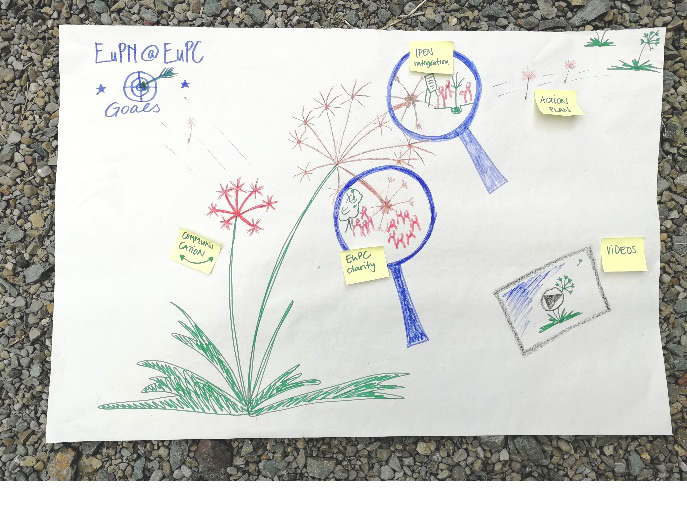 We used the arrival day of the 8th to discuss and clarify how we would want to spend the following days and what we would like to get out of them. We wanted to take ourselves through a process which started out with a vision: in 2023, we want to have a big party to celebrate our achievements as the European Permaculture Network. How do we get there?
We used the arrival day of the 8th to discuss and clarify how we would want to spend the following days and what we would like to get out of them. We wanted to take ourselves through a process which started out with a vision: in 2023, we want to have a big party to celebrate our achievements as the European Permaculture Network. How do we get there?
The EuPC started on the morning of the 9th with an Elders-panel. Ten people shared what brought them to permaculture and where they are at now. At the end of this panel, we had the opportunity to present the EuPN, to outline its roots at the European Permaculture Institute and to mention the vision that we are working towards. It was important to us to say that the EuPC is the meeting space of EuPN. At the end of this mini-presentation, we invited the EuPC-participants to join our first session: to plan the party in 2023.
The questions during the party planning sessions were: What do we celebrate? What are our achievements in 2023? And who will be invited? This was quite a big session with about 30 people joining.
From here, we worked in small groups and started to design an action plan of how to make those achievements and the party happen.
During our discussions about the party it became very clear that we want it to be an event which is happening decentrally across Europe, so that we cut down on CO2 for travelling, and also so that we can involve as many people locally and regionally as possible.
You can save the date already!
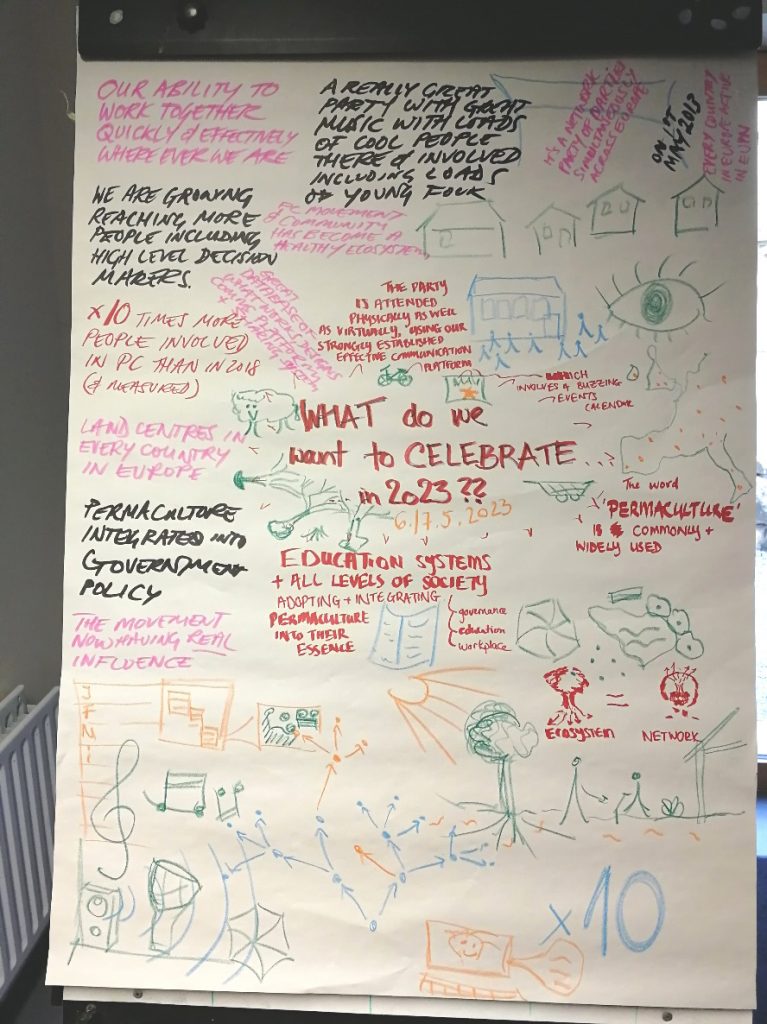 The working groups that met were:
The working groups that met were:EuPC-working group – discussing the future of the EuPC
=> info about this will follow
Education working group – blending EuPN-education issues with IPEN-issues and integrating IPEN into EuPN
=> the network will be kept updated
Communication working group – discussing information flows and different media
=> this will be continued in the online meetings of the group
A group that developed a draft of an action plan, putting the future achievements into goals and then thinking about how they could end up in a sensible and doable order
=> a team will continue to work on this and discuss possible funding options towards reaching these goals
We also got new people to join and spoke to representatives of both “Youth in Permaculture” and “Children in Permaculture” whether they want to become working groups within EuPN and join the General Circle calls, so that we can increase synergies.
This time, we did not have the technical equipment and possibility to offer blended EuPN-meetings for those that stayed at home, but we managed to write down a summary of results in our shared meeting notes file so that other EuPN-members could follow what happened.
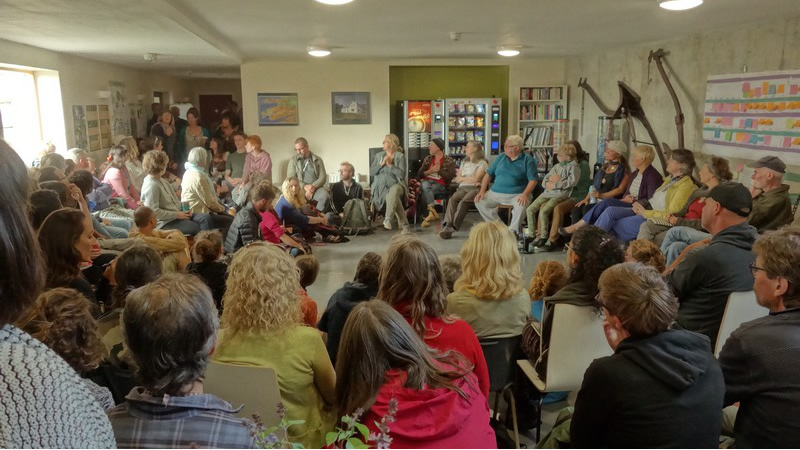
EuPC METHODS & TOOLS
EuPN WORKING GROUPS
EuPC / EuPN working group: discussing the future of the EuPC
Education working group: blending EuPN-education issues with IPEN-issues and
integrating IPEN into EuPN
Communication working group: discussing information flows and different media
a group that developed a draft of an action plan, putting the future achievements into goals and then thinking about how they could end up in a sensible and doable order
EuPC GUEST PANEL:
Themes: Honouring the Elders. Reaching beyond our Edge
EuPC OPEN SPACE WORKSHOPS
Why the OPEN SPACE FORMAT?
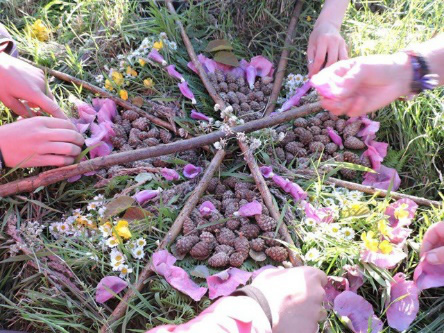 The aim and mission of European Permaculture Convergence (EUPC) is to share practice amongst ourselves, in contrast to the more public facing International Permaculture Conferences (IPC). With this in mind and from our own experience running the All Ireland Permaculture Gatherings using the Open Space methodology, the programme was generated from whoever has chosen to attend.
The aim and mission of European Permaculture Convergence (EUPC) is to share practice amongst ourselves, in contrast to the more public facing International Permaculture Conferences (IPC). With this in mind and from our own experience running the All Ireland Permaculture Gatherings using the Open Space methodology, the programme was generated from whoever has chosen to attend.
The purpose of this method is to take away hierarchy and create more meaningful exchanges peer to peer. It democratises these exchanges by consciously not elevating one person’s contribution over another’s. All contributions are valued equally. Attendees voted with their feet, going to what interests them, and were encouraged to move between concurrently running sessions if they don’t feel they are in the right place for whatever reason. We value those butterflies and bumble bees who are cross pollinating and helping to connect the many things going on.
” Whoever is there is meant to be there, what ever happens is the only thing that could have happened, it starts when it starts and its over when its over.”
We have chosen the theme ‘New Partners in Permaculture: Expanding Our Edge’; in order to have additional outward facing and cross-pollinating/networking. For that reason we invited some non-Permaculturalists who have relevance or connections to Permaculture such as speakers from Transition Towns, community gardeners, and so on.
Permaculture in Ireland is still a very young discipline. Unlike the UK and other countries around the world, there is no formal Permaculture Association in Ireland. But there is a loosely organised, distributed network across the Island. There are only a few public facing projects and practitioners. There are a number of PDCs and other Permaculture courses, and participants from these are spreading and growing, trying new things and learning lots along the way.
Attending a Gathering or Convergence has proven to be a great way to connect with like minded people and expand the network. The first gathering in 2011 was a simple collective of volunteers who came together for the first time to run a gathering and since then the Irish gathering has moved around the country with old and new volunteers picking up the work of organising a gathering and learning along the way.
The people in this fledgling network are ever changing and evolving as a group of volunteers.
At first this disruption to the more familiar patterns of hierarchy and control, of egos and politics can be confusing and challenging. People wonder, who is in charge? Who do I ask permission of to do this or that? Who will welcome me or invite me to speak? But then people start finding their niche. This is like in an ecosystem; it might be helping in the kitchen, offering a workshop, singing at the campfire, changing the toilet roll, or sitting at the edge of a group daydreaming under a tree. People take responsibility for their own choices, rather than there being a person in charge or a leader. So if you have something to offer that fits under the Permaculture ethical umbrella of Earth Care, People Care and Fair Shares then come along and offer it and see if anyone else is interested!
In this spirit, we openly invited anyone practicing Permaculture in Ireland, Europe or indeed further afield, to come join the convergence and share their stories and practice. We welcome to come and join in community. Everyone has a contribution. There is much work to be done.
EuPC THEMED COLLECTIVE SESSION:
Theme: Expanding our Edge
What are the opportunities to expand beyond our current permie ecosystem?
Permaculture Superpowers … What are the gifts we can share and what do we need to learn?
How do we make connections and engage?
EuPC CHILDRENS PROGRAMME & YOUTH LED SESSIONS:
YOUTH LED SESSIONS: CIP – CHILDREN IN PERMACULTURE
90% of children do not play in nature such as woods or countryside. This leads to disorders of concentration, physical and mental disease, sensory processing disorders etc.
Humans are living in harmony with each other and all nature, and all children can access education based upon the Ethics of Earth Care, People Care and Fairshare.
www.childreninpermaculture.com
CIP conference: 8th + 9th July 2019, London UK
YIP – YOUTH IN PERMACULTURE
Youthinpermaculture.org
CHILDREN’s PROGRAMME & FOREST SCHOOL
 Given the natural magnificence of the site at Knockree Youth Hostel, lands in the Glencree Valley and the depth of experienced outdoor youth educators we’ll have on hand, we designed the EUPC for Kids around the theme of “Children in Nature”.
Given the natural magnificence of the site at Knockree Youth Hostel, lands in the Glencree Valley and the depth of experienced outdoor youth educators we’ll have on hand, we designed the EUPC for Kids around the theme of “Children in Nature”.
The Valley’s name is Gleann Crí which one translation suggests means the valley of the heart. It is host to diverse landscapes ranging from ancient Oak/Ash woodlands to sprawling meadows and the meandering Glencree river; the perfect setting for adventure and immersion in the natural world.
Ethos:
Nature Mentoring and Forest Schools operate under an ethos of connection. Connection to ourselves as individuals, connection to others as a community, and connection to the Earth as our home. People, especially children, make connections naturally and it is the role of the mentor/forest school leader to facilitate this process – not by information packed lessons but rather by holding the space for timeless interactions to take place in the natural world.
A firm connection to self, others, and the world around us is a foundation from which people (of all ages) can live a healthier, more confident life in deep respect for our natural environment – growing into stewards for both their local communities and the Earth.
More information on the Irish Forest School Principles:
https://irishforestschoolassociation.ie/key-features-of-forest-school/
Nature-Based Mentoring in a nutshell
Connects people through lived experiences to the world around them.
Utilises time-honored outdoor skills and traditions to bring people into direct relationship with their local environments and communities.
Emphasises routines of connection over information-filled lessons.
Optimises awareness of the present moment.
Meets people where they are at, rather than setting expectations.
Promotes personal development, confidence, competence, and sense of self
Teaches through play, role-modelling, shared curiosity, and “growing edges”.
Holistically engages body, mind, and spirit.
Rekindles our natural ecology.
Programme outline and description:
We developed a creative programme of activities led by inspiring permaculture and forest school educators/nature mentors from around Europe.
For the youngest members of our tribe (from 0-3 years) we provided a cosy corner with breastfeeding pillows, nappy mats, toys, and other facilities enabling parents to be comfortable with their children.
Children aged 4-12 years were ably entertained with a wide variety of fun activities/experiences out in nature, such as eco arts and crafts, permaculture/nature games, carving, fire-making, rope swings, den-building, singing, music-making and wandering the landscape. Parents with young ones (under 4 years old) were welcomed to join in these activities provided they offer supervision of their little ones.
Teenagers had a dedicated fully equipped Teen Zone for hanging out in. Once teenagers are booked in to the event, they had access to a private Facebook group to ‘meet’ each other before the event.
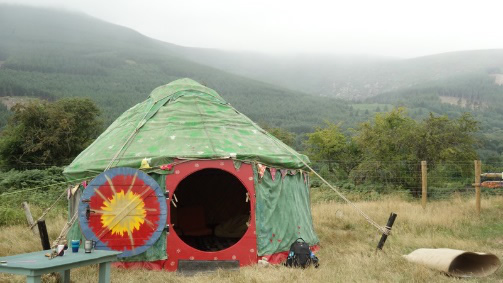 The EUPC Kids Area – a communal space for educators to offer youth workshops / programmes, parents to hangout and relax, and overall free-flow for kids to play and explore.
The EUPC Kids Area – a communal space for educators to offer youth workshops / programmes, parents to hangout and relax, and overall free-flow for kids to play and explore.
Youtube Video with Marc Baker, Youth Programme Coordinator EUPC18:
TALANOA PROCESS – A disruption to old patterns
At the 2018 European Permaculture Convergence we hosted a Talanoa Dialogue for Climate Ambition, with any attendee who wishes to represent members of the wider permaculture community from across Europe, and invited representatives or partners from aligned movements from our invited contributors. We used the input the harvest from this session and the shared vision from a permaculture worldview and community of practice.
For the All Ireland Permaculture Network The Talanoa Dialogue approach represents values and practices that are aligned with our own. Permaculture has a rights based focus and facilitation ethos. At the grass roots and community level we have been using very similar methods for our discussions, decisions and visions and were very excited to see this tradition permeate the COP Facilitative Dialogue in 2018
What is the Talanoa Dialogue?
The Talanoa Dialogue is to engage in story telling with a purpose, helping to spread the COP23 and COP24 Presidencies’ call for maximum ambition and maximum action.
Talanoa is a traditional word used in Fiji and across the Pacific to reflect a process of inclusive, participatory and transparent dialogue. The purpose of Talanoa is to share stories, build empathy and to make wise decisions for the collective good. The process of Talanoa involves the sharing of ideas, skills and experience through storytelling.
During the process, participants build trust and advance knowledge through empathy and understanding. Blaming others and making critical observations are inconsistent with building mutual trust and respect, and therefore inconsistent with the Talanoa concept. Talanoa fosters stability and inclusiveness in dialogue by creating a safe space that embraces mutual respect for a platform for decision making for a greater good.
At the Paris Conference (COP-21), the Parties to the UNFCCC decided to convene a Facilitative Dialogue in 2018 with two objectives:
- to take stock of collective progress towards the long-term goal of the Paris Agreement.
- to inform the preparation of nationally determined contributions (NDCs) to be submitted by all parties in 2020.
The Dialogue is facilitated jointly by the Fijian COP-23 presidency and by the Polish COP-24 presidency. Fiji stressed that the process should be inclusive, participatory,and transparent and that inputs provided must aim at promoting constructive and respectful discussions.
The Talanoa Dialogue is structured along three guiding questions:
Where are we?
Where do we want to go?
How do we get there?
Additionally, the presidencies have encouraged Parties and non-Party stakeholders to cooperate in convening local, national, regional, or global events in support of the Dialogue.
More information at https://talanoadialogue.com
For further information and questions: talanoadialogue@unfccc.int
CONTRIBUTORS & WORKSHOP LIST:
Guest Panel
Artistic Movement – Emily Archer
development sector – BOBBY MCCORMACK
community gardens – JOANNA BUTLER DONEGAL
Artist, activist and Freeconomy Community – MARK BOYLE
Global Ecovillage Network – John Paul Patrick
Ecolise – IVA POCOCK
Consumer Supported Agriculture – Roisin
Open Space Workshops
Biotime. Biological time use for permaculture designs – Maddy Hartland
Surfing the waves of change – Davie Philip
PC Ethics beyond slogans. Ecopsychology – Charlie Brennan
Cultivating the edge – Andy Goldring
PC on the Edge – Philip Allen
Rewilding and Natural Farming – Heiko Vermeulen
Seeds n Crops – Sandro Cafolla
Yoga meet Permaculture – Bridget O’Brien
The edible nature reserve. A 25 year old forest garden – Tim Harland
Permaculture Education development in Europe
– present and future / IPEN – Steve Charter
Natural Flood Management – Rod Everett
Diversity and globalisation – Somhairle McKay
Bee Keeping – Catherine Caulwell
Running a PC Business in the city – Max de Corte
Interconnection development and PC – Gareth Coulen, Elisabeth Westaway
Digitality and PC. Useful new technology. – Olga Chatzifoti
Trustees of the Permaculture Association – Sandy James
Positive Solutions around the world – Nicola Peel
VISIpedia Visual Pattern language capturing eco-issue and solutions – Valerie Seitz
Italian PC Academy – Anna Bartoli
Social enterprise model – Mihailo Nesic
diploma pathway cross-borders – Monika Frank
Introduction to GEN – John-Paul Patton
Enriched Earth Ecovillage – John-Paul Patton
Qualities of effective teaching – Sylvain Eymard
Brazil Community projects – Felipe Hoffman
Move with nature – Macha Shewolf
Edible Edinburgh – Seamus Stout
Guided Walk – reading the Landscape – Geology and ecological history of Glencree – Richard Webb
Grassroots fundraising for PC. The Weaver Network – Hannah Apricot
Forest garden in Mediterrenan climate – Mark Biffen
Social Permaculture and Selfcare – Kathleen O Hara Farren
Garden Skills for PC – Wendy Nairn
Visible Mending – Petra Krubeck
“More Clay, Less Plastic” project – Martha Cashman
Cocreating strategies to support sustainable development in Jamaica – Ramona Bavassano
PC and sustainable nutrition – Elisabeth Westaway
Sex and PC / Selfhealing – Charlie Gray
Living without technology – Mark Boyle
Listening to Plants / plant consciousness – Macha Shewolf
Ecolise. European day of sustainable communities – Davie Philip
From the deepest crisis to a working NGO. Czech PC Association – Eva Hauserová
Non-slaughter dairy production. Scania Sweden – Emilia Olausson
Regenerative shepherding. 10yrs of regenerative agriculture in Spain – Ana Digon
Children in Permaculture – Lusi Alderslowe
Youth in Permaculture – Mandy Merklein
Biochar – Benjamin Reule
Carraig Dulra. Irish Permaculture. – Suzie Cahn
Cork Food Policy Council/ FoodCloud/ alternative health – Eoin MacCuirc
Hypnotherapy – Hamed Al-zarrad
EuPC18 Some inspirations of the Open Space Workshops
REACHING BEYOND OUR EDGES. GUEST PANEL
HOW PERMACULTURE CAN INTERACT WITH THE “OUTER WORLD”
1) PERMACULTURE AND CONSUMER
Roisin – Consumer Supported Agriculture Movement
From CSA in Maynooth.
Urgency of international organisation of Community Agriculture.
7 CSAs in Ireland; informal network.
Grower – land- community
Conscious consumer movement at its core. Relationship between grower and group of consumers to share the risk from grower’s business. Takes away the need for marketing/ advertising. Some CSAs – group of consumers collectively decide upon the price; determines farmer’s income, and sets a fair price (not cost cutting – fair pricing).
How can perm and CSAs co-benefit?
CSAs waste time setting up as an organization; could avail of the existing Permie network.
Can learn from permies re soil health, growing techniques, etc. CSA offers a way to engage with permaculture while still having a ‘normal’ lifestyle.
Maximise relationships by meeting in person. Visit each other’s farms and learn.
Opportunities – bring compost to farmers in exchange for the CSA box (to bring additional fertility to the farmers’ land., in addition to paying for the box. Can divert food waste to the farmers for composting.
Equally permies recognize the responsibility we have, now need to take the risks to bring awareness to the masses.
2) PERMACULTURE AND ART
Emily Archer – Artistic Movement
Artist, did PDC at Suzie Cahn’s property as an ‘artist in residence’. Graduated during recession.
Found it difficult to navigate the art world, schmoozing around galleries. Not authentic.
Did she want to be in the art world or an artist? Works from a studio in Frances Street, Dublin. Calls herself an environmental artist, raising awareness. If anyone doesn’t feel a connection with the natural world, they find it hard to care what happens when the alarm bells go off.
Created a series of visuals for natural cycles, so that people can tap into these cycles and reconnect. People can feel reconnected with the natural world through that.
How can art benefit from world perm design?
Use resources that you have around you, using smart design choices. Permaculture is the way my mom organizes the kitchen. Lots of artists get overwhelmed by how to manage things – how to get the word out there about their art. More talented artists don’t get their work seen as they are not marketers.
Permaculture is about using your resources and networks to get the word out – this she learned from perm.
Anyone can be an artist – it’s a shame that people have an ‘otherness’ about the art world, shutting ourselves off from creativity. Give ourselves permission to follow our curiosity. In College you are given free reign to follow your own curiosity and passion. Keep trying to hone in on the next creation and vision. This applies to creation of a homestead or garden as well.
How to maximise the relationship between art and permaculture?
Everyone has sites/ farms. Loads of artists are looking for a place to be inspired and work! artists in Residency opps on farms/ organic/ permaulcutre sites.
Artists can empower children to learn about permaculture. Caroline Ross makes art from plants. Artists in residence in Future Orchards, Cork. Kids can do cob building – lifelong legacy, leave their mark on the world.
Architects and landscapers can learn from permaculture designers, benefit from expanding their ideas of design into designs from Nature.
3) PERMACULTURE AND DEVELOPMENT
BOBBY MCCORMACK – development sector
Developing Perspectives – specialize in education; tackle poverty equality and CC.
Have partnerships with orgs around EU and world. Encourage people to become much more involved in critical thinking. Work around problem-solving also – permies do this brilliantly – a hands=on approach which is tangible; something other organisations could learn from.
Encourage active citizenship and issues in their communities. They learn from and share with.
Systems thinking view of the world – for DP and Permie org. Many issues are deeply interwoven across the planet.
Language of development has been captured by the tyranny of the development framework. Many communities around the world are doing things brilliantly and just need to be left alone/ supported, rather than overtaken by large development organisations.
Development education does power analysis very well – see ourselves as part of the power structure rather than being outside of it. WE can do lots more than we currently are doing. Being agents of change. Third level students felt they could make no difference in the world when surveyed in Ireland.
Tendency to work in silos in most organisations – Convergence model can bridge different areas in a practical and forward planning way. Scale of crises demands that we partner and collaborate a lot more.
Bridge 47 is an EU initiative – project to reach out beyond traditional practitioners of development. Has a lot of possibility, to bridge with other organisations and get beyond the ‘normal’ relationships.
4) PERMACULTURE AND COMMUNITY GARDENS
JOANNA BUTLER DONEGAL
Moved to Donegal from city; learned how to grow her own food. 2010 bought small holding and growing veggies. Local child care group asked her to host a grow group. Joined Community Gardens Ireland (2011 set up in Ireland) in 2013. Voluntary led network all over Ireland – have online map of gardens. Meet up 4 times a year all over Ireland, have a newsletter.
Role is to people gathering as well as gardening. Also involved in Citizen Science and the Grow Observatory online – a learning network. Put sensor into ground and they monitor soil moisture, light, intensity. Grows a database which allows scientists to validate information from satellites. Way to engage people with their soil and growing.
Did her PDC; started a CSA at home.
How can we maximise CSA/ CG and permie?
Get involved in each other’s organisations. Attended here to forge connections. Support your community gardens and get them bringing in permaculture techniques and principles.
Soil to Sky – permaculture right at the heart of this online course. Deepens your knowledge about soil. Sign up to Grow Observatory online and get involved.
Eion McCuirc – Ireland’s data is open data. Open data movement, many govts signing up to it. Open Government Partnership. All data is made available in open data format, to allow access to anybody to use. Websites – data.gove.ie or data.gov.uk.
5) PERMACULTURE AND GIFT ECONOMY
MARK BOYLE – Artist, activist and Freeconomy Community
Small holding in Co. Galway. Gift economy – form of social structure and economics, doesn’t involve money. Uber, Air BNB is the sharing economy. Gift economy is differentiated by being without money. Every species on the planet operates in the gift economy.
Free hostel – people come and stay for free. Rent free farmhouse, people can live there rent free to get back to the land. Set up a project called Freeconomy; biggest sharing economy in the world, 10 years ago. Fell out of love with technology since then. Gift economy works well in a local format. When put online it needs money required to retain a non -money economy!
Get rid of obsession with technology to solve everything or ‘help’ everything. Important not to idolize technology as it is so destructive in the construction of the materials and mining of materials.
How might Permaculture benefit from the Gift Economy?
Money is a big separator – it separates us from ourselves and from the land. Can buy stuff from all over the world and you don’t have a relationship with the person you are buying from. Money can dictate your projects in permaculture – need money to get started. Re-localise permaculture so that it moves away from money-based systems. Connect with community and land.
6) PERMACULTURE AND ECOVILLAGES
John Paul Patton, GEN
Wants to set up a series of ecovillages in Ireland. Has done 7 residential ecovillage studies in Europe. GEN Ireland is connected with GEN WISE. 10,000 communities within 45 national networks. On most continents! Way of looking at the world and ecosystems including humans and built around participatory process. Based around ecology, culture and society as much as environment and economy. Very much collaborative with Transition Towns. Working on a global level. Indigenous cultures are so eroded as to be invisible in Western countries (eg Irish language, culture).
Sense of global movement right across a planet; seeds have spread across the Earth and are starting to generate. Might forces for change in the planet; people coming together with a real sense of unity and purpose. Ecovillages – many see themselves as laboratories, it’s not right to idealise them, but they are fulfilling a great need. When you tap into the landscape as sacred, it enriches us in ways that we are not currently being fed.
GEN is solutions oriented and builds communities. Can knit in with Permaculture. Intentional communities, urban ecovillages and rural ecovillages (prevents brain-drain).
How can we maximise relationship with GEN and permie?
Our design tools and maps are symbiotic. GEN has a big global lens, and permaculture globally has similar lens.
7) PERMACULTURE AND ECOLISE
IVA POCOCK
Communication coordinator for EcoLise. Ecolise.eu. FAcrony, – EU network for …c
Founded 2014 from a report written by Eamonn O’Hara, involved in rural development. Wrote about community led initiatives happening all over EU. Merged into Ecovillages and Permaculture movement. Have 43 members (Organizations, including research organizations). Raise profile of community led initiatives, influence policy and create well of information. How are community initiatives making a difference for climate change, low carbon world?
22nd September – Ecolise event. (Please register an event!!!). Sustainable-communities.net
(Can be as little as a group of friends over dinner).
European Day of Sustainable Communities to raise awareness and the profile of Sust Communities among politicians, to attract funds. Brussels is a city of lobbyists, situated a stone’s throw from decision makers in EU. Our voices need representation, and Ecolise has a policy person to ensure small voices are heard at this level. Council of EU put out statement to Foreign Ministers to give communities the right to enable small NGOs to participate in COP meetings. Policy makers need to meet with these voices.
Permaculture is one of the main pillars of Ecolise. Have partnered with European Economic and Social Committee in Brussels. Other main pillar is knowledge and learning. Have an online series – available to all.
How can we expand our edge?
Ecolise was created out of these Permie/ Transition/ etc movements across Europe.
if there is a chance of doing harm, you need to move very carefully. If there’s the possibility of doing good, you should do as much as possible
6 – EXPANDING OUR EDGE. THEMED COLLECTIVE SESSION
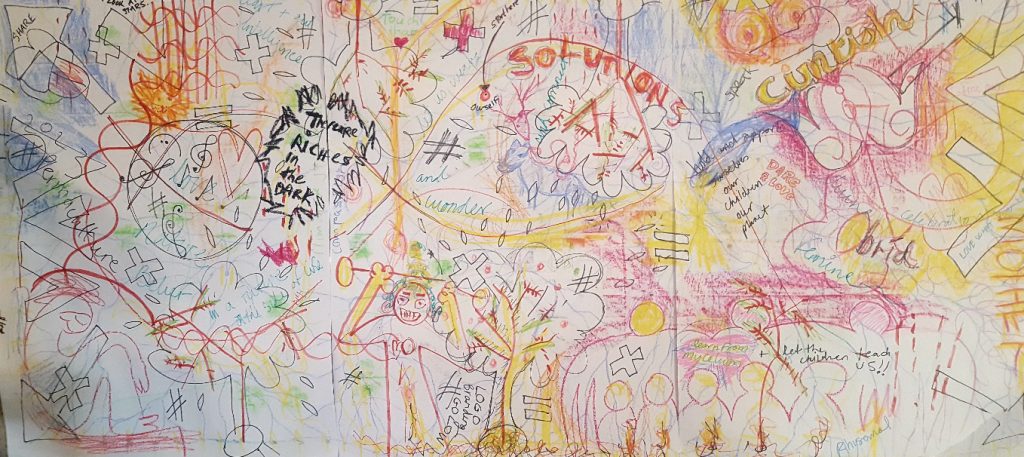
What are the opportunities to expand beyond the current permie ecosystem?
- Wearing different hats.
- Use language and communication platforms – not to overwhelm or alienate but to bind together.
- Approach with accessible language. Go bigger and use bigger platforms like Weaver network to publicize what is going on.
- Permaculture systems thinking to bring together disparate organisations and groups
- Keep it simple
- Build confidence in self-expression. Taking a holistic approach.
- Expanding beyond elite borders. Recognizing where Permaculture already exists and celebrating this
- Permaculture events like for example the European day of sustainable Communities (22.09.2018).
- Mainstream networks, events, media, politics / with the qualities of bravery, friendship and listening
- Conscious consumer movement. Active citizenship
- Local food movements
- Education: CIP, university departments. going into universities, public and private schools. For landscape design or architects, also for educating students.
- Youth opportunities – art, sports, festivals. Get GAA to pant ash trees and use that to engage a conversation on that. Connect with wider youth movements, school gardens, Youth in
- Permaculture. Learn from kids approach
- Grassroots education and accelerating this learning
- Use Climate change as common ground and use permie as solutions offering. Use climate tipping points to engage. Engage local councils with climate initiatives
- Linking to political process
- Health and well-being
- Art
- Alternative currency
- E.g. pioneers of change festival Austria
- Relationship with animals
- Connection to nature: getting people outside sit spot. Identifying transformative moments
- Use media
- Festivals –could use permaculture group to create handbook on how to permaculture your festival. Permaculture applied to festivals, fairs
- Social circles and networks. face to face meetings. family
- Conventional farms
- Face to face meetings with people we know already, to initiate awareness. Young farmers’ unions to get into conventional farmers. Beach cleanup groups, who are awakening.
- Faith-based organizations, who are interested in taking care of God’s creation; Buddhism, Christianity, etc.
- Many local organizations working on similar things in parallel – using permaculture to bind them together.
- Care sector – the “people care” side of things.
- Libraries – hubs for knowledge.
- Women’s’ institutes to strengthen rural and community life.
- Refugee and climate situation: permaculture as post-crisis support
- Connecting with political sphere – local councils, who already have common values. Personal relationships – use personal connections. Be brave and approach politicians
- Attend local events, festivals for any reason. Local groups such as Tidy Towns movement.
Permaculture Superpowers … What are the gifts we can share?
- Offer permie ethics and values through honest and credible stories of success and failure with knowledge, listening and care
- See abundance
- We love living. Our positivity
- Artivism. Craftivism.
- AHA-moments
- Plant a seed, get people outside.
- Observation and listening skills
- Our ways of educating and learning. Formal and informal methods of education. Heritage in schools. Permaculture is a system of looking at ourselves first.
- Rites of passage – needed by youth.
- Leverage heritage of ancestors who had techniques.
- Economy of the common grounds
- Heritage and ancient wisdom. Local traditions and crafts
- Ecosystems thinking
- People care – older people. The elders
- Already doing it. And share!!
- Offer workshops to mainstream
- Gifts – we can offer hope.
- Artivism – using art to get message out there.
… and what do we need to learn?
- Learn through mainstream, movements and networks the language to open doors
- Learn to market ourselves. Clear simple definition. Logo. Branding – using an international logo that is recognized so people see it over and over again.
- Looking at successful strategies, what is the best in the field – online presence? Mimicking and learning from corporations and other successful strategies.
- To offer permaculture ethics and values – through honest and credible stories of successes and failures with the listening care of communities.
- Introduce to new age
- Governance, empowerment to our movement
- Green building
- Documentation
- Show value through celebration. Rites of passage
- Perm can build bridges between organizations as we have the big picture/ whole systems thinking.
- Keep it simple, clear, language. We love life! Rather than using the word Permaculture. Learning from youth and children.
- Being outdoors and climbing trees. What transformational moments can people have, which can open a window of opportunity to connect with permaculture?
- Make more of the international day of permaculture
- Bring observational skills. MOOCs – produce a taster about permaculture! Celebration of what we have. Using #permaculture to enable people to search Twitter easily for resources.
How do we make connections and engage?
- Live by hands-on example and have brave, bold, credible, meaningful and open conversation (and listen!) to find common ground with other movements to change of mainstream people. Making the most of m+m events, virtual force, music and art, food
- Festivals and fun activities
- Offering and showing alternatives to consuming
Wildness. Our own spaces and ways to play - Each of us can be a permaculture ambassador within our own circle and communities.
biodiversity - Advocacy in training.
- Mentorship. Less academic, more hands-on approach, using art. Mentorship as opposed to WOOFing, to link in with youth organizations and take on kids one to one. Intergenerational approach.
- Celebrate who you are, not pushing
- Local. Local. Local.
- Grow everywhere
- Open dialogues
- Using social media.
- Rigorous evidence.
- Find a common language without using the term permaculture. Use appropriate language to business, NGO and public. Visual diagrams help!
- Synergy with other organisations and local communities. Contribute and connect with their work.
- Using advocacy and training to advocate, strategize and lobby and present to the public.
- Adapting to the audience and changing our message to meet their needs. Have a presence at top level meetings, to get access to decision makers.
- Housing-redesign
- Using prisons – take permaculture there.
- Artists in Residence
- Replicating “control-shift-events” and processes.
- CONTROL SHIFT – an emergency summit for change. Held in March in the UK. Has about 80 – 90 organizations working on climate change. Scope for transformative action on a national level.
- Shared mission at the center – of climate change, rather than being branded as permaculture.
- Be aware and presence at top level meetings UN
- Connect to UN SDGs and Agencies
- Climate change commission. Encourage Green party politics
- Listen to peoples needs and defining our reach and target
- Engaging scouts in permaculture – one of the largest youth organizations in the world.
- Friends network
- Be inclusive: link with other sustainability groups, talking to local politicians
- Who are local stakeholders affected
- #permaculture. Social media. Virtual connections
- Your Christmas dinner. Importance of social connections. Barter system. Cross match making. connections – powerful personal levels. Listening to people’s needs before offering solutions.
- Celebrate existing solutions. Simple language, and connection to Nature – our greatest asset.
- Empathy and relationship with animals, plants and the Earth.
- Using ‘Earth Care, People Care, Fair Share’ language.
- Using empathy and compassion to eliminate judgement/ exclusion. Doing own self-healing work to come from a place of health.
- Write into government enquiries – you can have a big input, proportionally.
- Establish your network locally – your neighbors. Doing rigorous permaculture research and getting it published
- Systems thinking skill
- Local events. Evening lectures series in different environments
- Permaculture to bridge gaps between different organisations by similar goals
- WWOOF
- Men’s shed. Tree plant competition
- Having a grassroots approach, can rise up through the hierarchies of larger organizations. International League of Conservation Photographers – can use them to tap into permaculture. Find your place to play! Find advocates in social media – people with large followings, who can start injecting permaculture ideas to their following.
- Connecting to the YHA across the world. These are hubs that people can be exposed to permaculture in!
- Letter to the Editor – write a letter to reach out to people beyond the choir.
- Who can you talk with to get the engagement conversation started?


